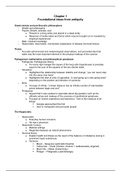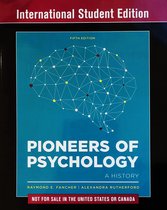Chapter 1
Foundational ideas from antiquity
Greek miracle and pre-Socratic philosophers
- Wealth and philosophia
- Psyche: Breath, animate, soul
o Present in a living entity and absent in a dead entity
o Reservoir of innate ideas and forms which may be brought out or revealed by
empirical experiences
- Math, medical knowledge
- Hippocrates: observation, mechanistic explanation of disease (humoral theory)
Thales
- Accurate astronomical and meteorological observations, and promoted idea that
water was the most important element in the physical makeup of the cosmos
Pythagorean mathematics and philosophical paradoxes
- Pythagoras: Pythagorean-theory
o For every right triangle the square of the long side (hypotenuse) is precisely
equal to the sum of the squares of the two shorter sides.
- Heraclitus
o Highlighted the relationship between stability and change: “you can never step
into the same river twice”
o Highlighted the idea of unity of opposites: “a road going up is also going down”
depending on the position and direction of someone
- Zeno
o Concept of infinity: “a linear distance has an infinite number of intermediate
points between begin and end”
- Protagoras
o Argued that it was useless to speculate about big question such as the
ultimate nature and makeup of the universe or hypothetical paradoxes
o Focused on human experience and behaviour: “man is the measure of all
things”
Gorgias approached this first
How to manipulate and persuade people
The Hippocratic
- Hippocrates
o Everyday human concerns
o He was a physician
- Hippocratic Corpus
o Medical writings
o Regarded diseases as natural phenomena
- Humoral theory
o Explain health and illness as the result of the balance or imbalance among 4
prominent liquid substances
o Humours
Blood – Sanguine (optimistic/cheerful)
Yellow bile – Chole (cholera, choleric = restless/easily angered)
Black bile – Melan (melancholy)
Phlegm – Phlegmatic (calm/lethargic)
, o People are healthy when humours exist within reasonable balance within
themselves
o Removed excess humours by bleedings and purges. Therapeutic benefits of
herbal and pharmacological substances
The life and thought of Socrates
- Wisdom lay in knowing how much he did not know
- Knowledge lies within the psyche
o Forgotten when reborn, but possible to recall
- Philosophical nativism
o Concepts are already in the brain at birth
- Insight
o Mind contains capacities for interpretation that go further than passive
experience of the stimulus
- “know thyself”
- Xenophon
o Most famous of his students
o First great historians
Plato’s life and philosophy
- Explored Socratic question if what is innate
- Added question what is the relationship between those innate features and sensory
experiences imposed on the psycho from the external world
- Platonic Idealism
o Appearance
Person’s actual conscious experience of something as when we see
something
o Ideal forms
Representing essences of all tress, all horses etc.
View that there exists something more fundamental and ultimate lying
behind every day sensory experience
Idealism
o Allegory of the cave
Imagine prisoners in a cave, facing the back wall. On the other side,
men walk with puppets on a stick. The sun shines on them and the
prisoners see the shadows of the puppets on the wall. The prisoners
know what’s going on, only indirectly and incompletely and not in their
full reality.
The shadows are like Plato’s appearances and the real events
like his ideal forms
- The Platonic Legacy
o Psyche has three basic components
Appetites (physical gratification)
Courage (confront difficulties with action)
Reason (Appreciate underlying realities of the world)
o In each person, three components in different proportions
Appetites – ordinary masses
Courage – soldiers
Reason – elite guardians
Innate and fixed – nature and heredity
Aristotle and Empiricism
- Theophrastus
o First student
, o Interest in diversity of life forms in the natural world
- First recorded and systematic observation
o Aristotle focused on animals
o Theophrastus on plants
- How do we get knowledge?
o Observation, classification, taxonomy
- Lyceum
o Own school
o Broader in scope
- Biological Taxonomy
o Arrangement of organisms in to hierarchically orders groups and subgroups
- On the Psyche
o Scale of nature
Hierarchical ordering bounded by simple plants at the bottom and
humans at the top
Plants:
o Nourish themselves
o Reproduce
Animals
o Move themselves
o React to changing stimuli in environment
High animals
o Remember and learn
Highest animals
o Imagination
Humans
o Reason
o Vegetative soul
2 abilities combined
o Sensitive soul
4 abilities of animals combined
o Rational soul
To have all abilities and also reason/think logically about remembered
or imagined experiences
o Sensation
Sensory organs receive impressions or imprints from stimuli that strike
them from outside world that replicates its essential feature
Becomes basis of memories
o Categories
Memories and ideas of empirical experiences are classified and
organized
Substance (what something is)
Quantity (how many)
Quality (what shape, colour etc)
Location
Time
Relation (bigger, smaller, before, after etc)
Activity (what is it doing or undergoing)
o Aristotelian logic
Fundamental aspect of Western psychology
How various kinds of subject-predicate statements or propositions
relate to and interact with each other according inferred laws of logic
, Atomic footnote: Democritus, Epicurus and Lucretius
- Physical foundations of the universe
o Fire, air, water and earth
- Democritus
o Atomic theory
There is a limit to the divisibility of all material objects, and that they
are ultimately composed of tiny, solid, unbreakable particles, atoms
o Atoms have differing shapes, universe is entirely made up of an unlimited
number of solid atoms moving about in otherwise empty space, the void.
- Causality
o Every caused event had to have a purpose
- Aristotle
o All caused events had to have four essential components:
o Material cause
The stuff out of which something is made
o Formal cause
The idea or plan behind the caused thing
o Efficient cause
The actions or interactions that bring the caused thing into being
o Final cause
The purpose for which the thing is caused
- Epicurus
o Adoption atomic theory, one should not fear the irrational or punitive whims of
capricious gods, but should conduct one’s life as tranquilly as possible in the
pursuit of socially responsible happiness
o Epicureans
Human psyche are nothing but collections of material atoms
o No hedonism, but self-sufficient life free from pain and fear, in the company of
friends
- Lucretius
o Poem (De Rerum Natura) about principles of Epicureanism, including
atomism, moderate hedonism and materialistic conception of the soul
Three Islamic Pioneers
- Islamic empire
o Great scholars with new and revolutionary ideas
- Al-Kindi and Indo-Arabic Numerals
o Al Kindi
Translated Greek texts to Arabic
The philosopher of the Arabs
o Indo-Arabic numerals
Mathematical numbering system that had been developed in relative
obscurity in India
Numbers from 1 – 9 and 0
Clear system for performing arithmetical calculations
- Alhazen and Modern Visual Science
o Alhazen
Book of Optics
Vision involves rays of light going into the eye
Based on experimental methods and observations
Camera Obscura





